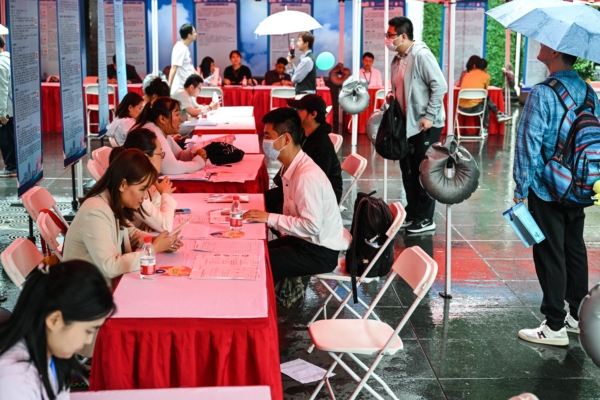Due to the Chinese Communist Party’s crackdown on educational businesses, He Ajun decided to exit the education industry in August last year. Following that, she embarked on a new career as an “unemployed internet celebrity,” a second career that was previously unimaginable.
At the age of 32, He Ajun, a video blogger from Guangzhou, has 8,400 followers. She documents her journey of long-term unemployment and provides career advice to her fans. Through posting videos and ads on her blog, offering private consultations, and selling handicrafts on the streets, He Ajun earns about 5,000 Chinese Yuan per month (approximately 700 USD).
“I believe that freelancing will become more common in the future,” He Ajun told Reuters. “Even if you stay in the job market, the ability to freelance is essential. I believe it will become a backup skill, like driving.”
The Chinese authorities are accelerating the development of so-called “new productive forces,” but their policy goals are limited to narrow technological fields such as artificial intelligence (AI) and robotics.
Critics argue that this may lead to weak demand in other sectors, leaving an entire generation of highly educated young people struggling to find employment. They missed the last economic boom at the time of their graduation and did not have the chance to receive relevant education in emerging industries.
This year, China has witnessed a record-breaking 11.79 million university graduates, yet the job market is facing unprecedented challenges. Many white-collar industries, including the financial sector, have been conducting widespread layoffs and salary cuts. In recent months, companies like Tesla, IBM, and ByteDance have been trimming their workforce.
In July, the urban youth unemployment rate in China for ages 16 to 24 surged to 17.1%. Analysts believe this figure could be significantly underestimated, concealing millions of unemployed in rural areas.
Since the peak at 21.3% in youth unemployment rate in June 2023, the Chinese authorities stopped releasing data on youth unemployment and later revised the criteria, excluding students still in school.
Currently, the gig economy in China is expanding rapidly, with over 200 million people involved in “flexible employment,” accounting for 14.3% of the total workforce and growing at an annual rate of 8%. However, there is an issue of oversupply in this sector. Several cities in China issued warnings this year, urging unemployed citizens not to resort to becoming ride-hailing drivers.
The wave of layoffs has even reached government departments, once considered “iron rice bowls.” Some Chinese netizens predict that the iron rice bowl is going to turn into a “paper rice bowl.”
Last year, Beijing announced a 5% reduction in staff, leading to thousands of layoffs as per official announcements and news reports. Henan Province cut 5,600 jobs earlier this year.
Since 2022, Shandong Province has laid off nearly 10,000 employees and recently transformed provincial public institutions into enterprises, transitioning 100,000 public employees to corporate workers. Experts believe this is due to local governments facing fiscal insufficiency and hoping companies can support these individuals.
Due to the scarcity of jobs, many university graduates are now taking up low-end manufacturing and service industry positions. According to Yao Lu, a sociologist at Columbia University, approximately 25% of college graduates aged 23 to 35 are currently working below their educational level.
Citing the sensitivity of the topic, a Chinese economist who requested anonymity stated that many of China’s nearly 48 million university students may have lower starting salaries and consequently contribute less in lifetime tax revenue.
“While they cannot be labeled as the ‘lost generation,’ it represents a significant waste of human capital,” the economist told Reuters.
Amid the challenges of the job market, young Chinese people are sharing their experiences of long-term unemployment online.
On the platform He Ajun uses, there are billions of views on tags like “unemployment,” “unemployment diary,” and “layoff.”
Users detail their daily struggles, count the days since being laid off, share awkward conversations with supervisors, exchange advice, and sometimes even post tearful selfies.
Yao Lu told Reuters that the visibility of unemployed youth is increasing, leading to broader social acceptance and reducing the stigma around unemployment, enabling isolated young people to connect.
Yao Lu mentioned that unemployed graduates are realizing that blaming the government for their predicaments is both dangerous and ineffective. Instead, they are more likely to hide dissatisfaction, avoid blame, and choose to “lie flat.”
As an internet celebrity, He Ajun believes that graduates should lower their ambitions.
“If we’re really entering a ‘trash time,’ I think young people can accumulate skills or do something creative, like selling goods through social media or making handicrafts,” she said.

